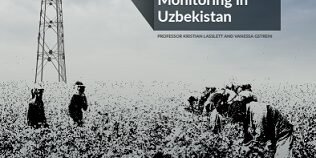Report: Measuring Forced Labour in an Authoritarian Context – An Evaluation of ILO Third Party Monitoring in Uzbekistan (English version)
Corruption and regimes of forced labour in Uzbekistan are closely entwined. This is exhibited most acutely in the cotton sector. Revenues from the export of cotton are hidden by the state, and rent-seeking from public officials goes hand in hand with the coerced recruitment process.
Owing to the courageous work of activists, independent monitors, journalists, victims, and whistleblowers a spotlight has been placed on this nexus between corruption and human rights. In a welcomed move the Government of Uzbekistan has undertaken to end forced and child labour in the cotton sector. The International Labour Organization (ILO) has agreed to support and monitor this process.
In this report by Professor Kristian Lasslett and Vanessa Gstrein, CHRI examines the methodology used by the ILO Third Party Monitoring unit to measure incidences of forced labour in Uzbekistan. Serious shortcomings are documented with respect to research design, data-collection, data-analysis, and ethicality, which critically undermine the credibility and accuracy of the ILO’s findings. Extensive revisions to the ILO methodology and third party monitoring design are recommended.
Source: corruptionandhumanrights.org






